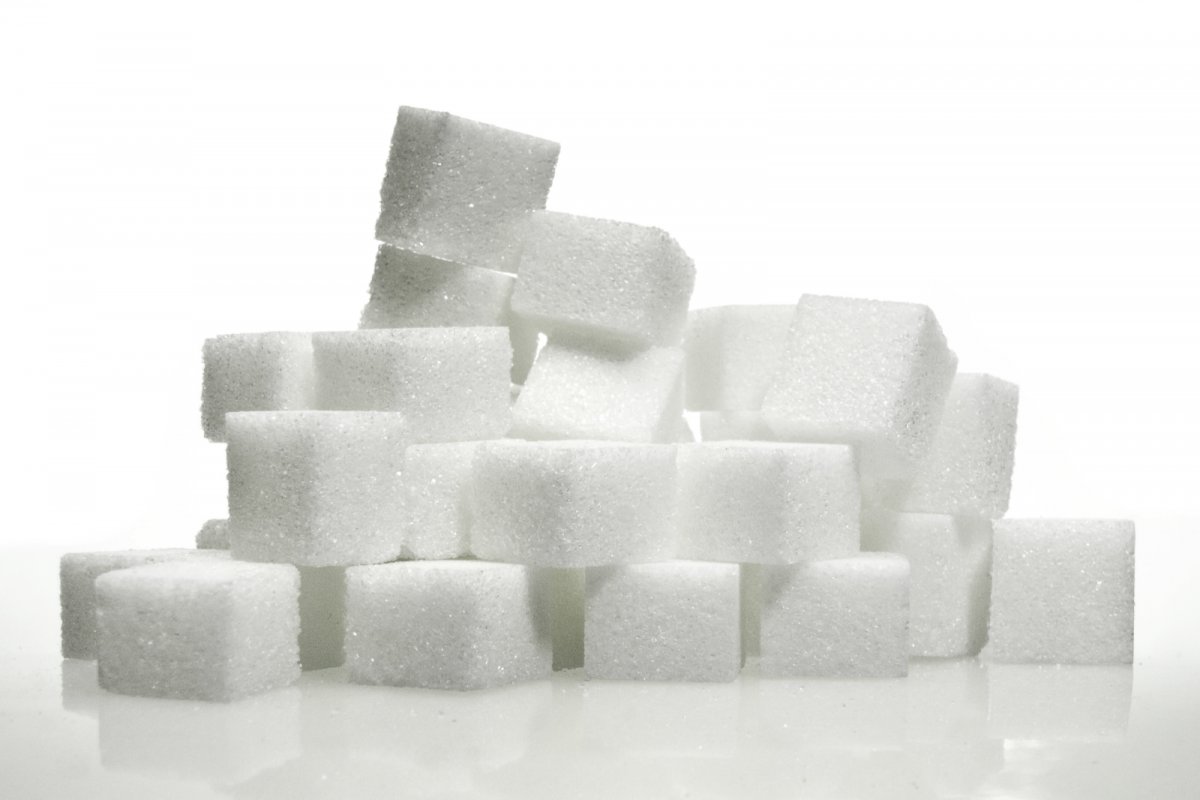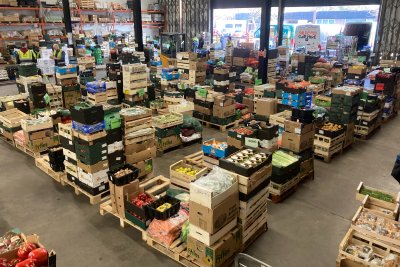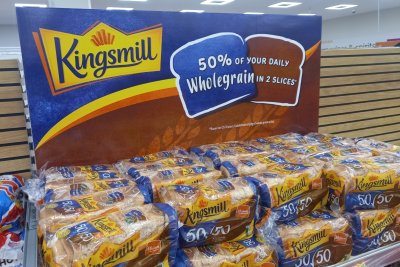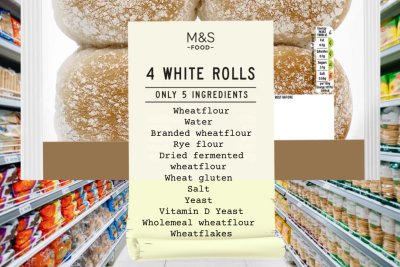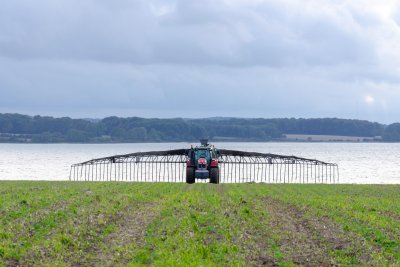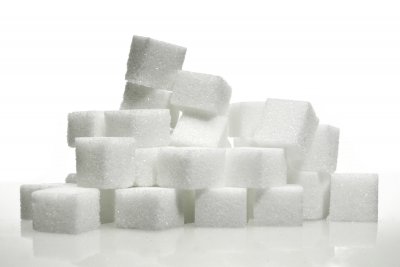 Sugar cubes in a pile. Credit: Pixabay / Humusak
Sugar cubes in a pile. Credit: Pixabay / Humusak
Could decreasing the availability of sugar in the UK be the key to reducing our sugar intake?
We eat too much, we sell too much, we grow too much, and we import too much sugar. As well as reconsidering the sugar we eat, it’s time to reassess the role of sugar beet in our fields, says Holly Gabriel.
We are no strangers to the sweet stuff in the UK. A lot of sugar is consumed here, in the form of both an ever-increasing range of sugary products, as well as the sugar we add ourselves to our food and drink. But do we ever consider where it’s all coming from?
The average annual supply of sugar from 2011-2020 in the UK was 2.21 million tonnes. Over half of this is produced here in the UK from home-grown sugar beet, and another half a million tonnes is imported as raw cane sugar and refined in the UK. The rest is imported in manufactured foods such as confectionery, chocolate and cake[1], with a smaller amount coming from imported beet sugar.
The latest evidence tells us that everyone over the age of 11 should consume no more than 30g of free sugars[2] per day. Using this as a benchmark, researchers at the Food Research Collaboration[3] calculated that for the UK population as a whole, we would use around 0.7 million tonnes of sugar per year, a mere third of what is currently supplied to the UK market. It’s clear that as well as having an excess of sugar being consumed, we have an excess of sugar growing in our fields.
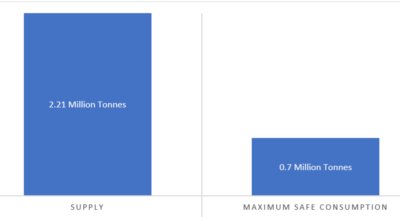
Source: Defra: Agriculture in the United Kingdom reports 2014-2021
How did we get here?
It started in 1493, when Christopher Columbus first took sugar cane to the Caribbean, laying the foundations of the profitable sugar industry which helped build the British Empire. However, for the sugar industry to grow to its full size it relied on the Atlantic slave trade involving captivity, displacement and death for millions of people. In 1800 it was estimated that for every two tonnes of sugar imported to England, one slave had died[4].
Today, in the UK, sugar production is tied up by just two major players. Tate & Lyle Sugars (Tate & Lyle UK sold its sugar business to American Sugar Refining in 2010 and now operates as a separate company[5]) is the only importer of raw cane sugar to the UK. The UK’s other sugar producer, British Sugar, uses sugar beet, grown domestically in the UK. British Sugar are the sole processor of domestic sugar beet and a part of the global company AB Sugar, itself a subsidiary of Associated British Foods[6] who also owns Primark. British Sugar Plc produces around 1.2 million tonnes of white sugar every year.
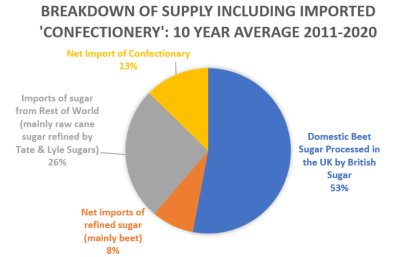
Source: Defra: Agriculture in the United Kingdom reports 2014-2021. Confectionary imports data from Richardson and Winkler (2019)
What is sugar beet doing to our soils?
There are some home truths about sugar beet production in the UK that need to be brought to the surface (to the topsoil, if you will).
- Sugar beet is causing irreversible damage to the soils in which it is grown.[7],[8]
- It is estimated that British Sugar is responsible for the removal of 600,000 tonnes of topsoil every year.[9]
- The annual soil erosion rate in the UK is at least 2.9 million tonnes before accounting for soil loss during harvest, which means that sugar beet harvesting is adding at least another 7% to the UK’s annual topsoil loss.
- In mild climates it takes about 200-400 years to form 1cm of soil, and it can take thousands of years for soil to recover if fertility is lost.[10]
To be clear, sugar cane is no kinder to the land it is grown on; cane causes soil erosion too as well as using more water and pesticides than growing beet.
What is sugar doing to our health?
Shops, cafés, garages, schools, hospitals and workplaces are full of cheap, sugary products, which are detrimental to our health yet pretty much impossible to avoid.[11]
- Sugar is a type of carbohydrate that provides both bulk and sweetness in manufacturing.
- The overabundance of sugar makes it a cheap ingredient, to create highly profitable foods and drinks.
- Our excess sugar consumption is causing tooth decay and contributing to the increase in those living with obesity, especially children.
- 20% of year six children are classified as obese and prevalence is over twice as high in the most deprived areas than the least deprived areas.
- Obesity is linked to an increased risk of type 2 diabetes, various types of cancer, cardiovascular and liver disease.
How can we reduce sugar consumption?
So, we eat too much, we sell too much, we grow too much, and we import too much sugar. Whilst there are some Government policies in place to reduce sugar from the demand side, such as the soft drinks industry levy, voluntary sugar reduction programme and advertising restrictions, there is a gaping hole in the Government obesity strategy[12] because the availability of sugar is not addressed.
Why are demand and supply side policies not linked?
This is a question that has been asked by those working in public health and food policy for many years, yet government have thus far refused to price in the the true cost of sugar production to society. Cynically, I would suggest, they are following the money. Tate & Lyle Sugars sponsored the lanyards at the 2017 Conservative Party conference, which at the time, saw a public-health eye-roll that measured 8.9 on the Richter Scale. This lack of joined-up policy was repeated in the infamous ‘Eat Out to Help Out’ scheme, subsidising fast food giants, just as the evidence starkly revealed an increased risk of severity of Covid-19 for those living with obesity. Surely subsidies should be channelled to more sustainable forms of food, agriculture and improving health?
What do we need in terms of action on sugar?
Sugar production is harming the environment and sugar consumption is harming our health. As well as reconsidering the sugar we eat, it’s time to reassess the role of sugar beet in our fields.
Who we are:
Action on Sugar is a group of specialists concerned with sugar and its effects on health. It is successfully working to reach a consensus with the food industry and Government over the harmful effects of a high sugar diet, and bring about a reduction in the amount of sugar in processed foods.
Feedback is an environmental campaign group that works to regenerate nature by transforming our food system. We expose systemic problems that have led to the environmentally and socially unsustainable use of resources within the global food system.
We believe that securing nutritious, delicious food for all can and should go hand in hand with regenerating our planet. Our Too Much of a Bad Thing campaign highlights the need to scale down the use of good soil to grow sugar in the UK and for Government to address high sugar consumption through supply-side policies.
What can you do to support?
Follow us on Twitter and join the conversation using #SugarSoilScandal
We will be releasing a series of factsheets in the coming months exploring the specific parts in more detail, so watch this space and sign up to our newsletter for updates.
References
[1] Winkler, J. & Richardson, B. (2019) Sugar reduction in post-Brexit UK: A supply side policy agenda. University of Warwick. https://foodresearch.org.uk/publications/sugarbrexit-supply-side/
[2] Swan et al. (2018) A definition of free sugars for the UK: https://www.ncbi.nlm.nih.gov/pmc/articles/PMC5962881/
[3] Based on a simple calculation multiplying the estimated UK population in 2017 of 66 million by 10.95kg (30 grams per day over the course of a year), rounded to the nearest 0.1 million tonne. Adjusting these figures for the number of young children in the country would lower this recommended amount further. https://foodresearch.org.uk/publications/sugar-brexit-supply-side/
[4] Coate, B. (1987). The Hunger Crop: Poverty and the Sugar Industry. Oxford, England: Oxfam. https://policy-practice.oxfam.org/resources/the-hunger-crop-poverty-and-the-sugar-industry-121196/
[5] Tate & Lyle (2022) https://www.tateandlyle.com/about-us/history
[6] Associated British Foods Plc is listed on the London Stock Exchange and is majority owned (54%) by Holding company Wittington Investments Ltd. In turn Wittington Investments Ltd are owned by the both Garfield Weston Foundation (79.2%) (who, without irony, fund health and environmental causes in the UK) and the Weston Family in Canada (20.8%)
[7] Ruysschaert, G., Poesen, J., Verstraeten, G. and Govers, G. (2005). Interannual variation of soil losses due to sugar beet harvesting in West Europe. Agriculture, ecosystems & environment, 107(4), 317-329
[8] Parlak, M. (2019) ‘Kök ve yumru bitkilerin hasadıyla oluÅŸan toprak erozyonunda kaybolan besin maddelerinin sera gazı ayak izi deÄŸerler (Greenhouse gas footprint of replacing nutrients lost through soil erosion due to root and tuber crops harvesting)’, Mediterranean Agricultural Sciences, 32, pp. 1–1. doi: 10.29136/mediterranean.468282
[10] Feedback (2019) Too much of a bad thing; the misuse of land and soils to grow sugar. https://feedbackglobal.org/wp-content/uploads/2019/11/Too-much-of-a-bad-thing-the-use-and-misuse-of-land-and-soils-to-grow-sugar-Feedback-2019.pdf
[11] Statistics on Obesity, Physical Activity and Diet, England (2020) https://digital.nhs.uk/data-and-information/publications/statistical/statistics-on-obesity-physical-activity-and-diet/england-2020
[12] Tackling obesity: government strategy (2020) https://www.gov.uk/government/publications/tackling-obesity-government-strategy
Children's Food Campaign: Campaigning for policy changes so that all children can easily eat sustainable and healthy food.
Sustain
The Green House
244-254 Cambridge Heath Road
London E2 9DA
020 3559 6777
sustain@sustainweb.org
Sustain advocates food and agriculture policies and practices that enhance the health and welfare of people and animals, improve the working and living environment, promote equity and enrich society and culture.
© Sustain 2025
Registered charity (no. 1018643)
Data privacy & cookies
Icons by Icons8
